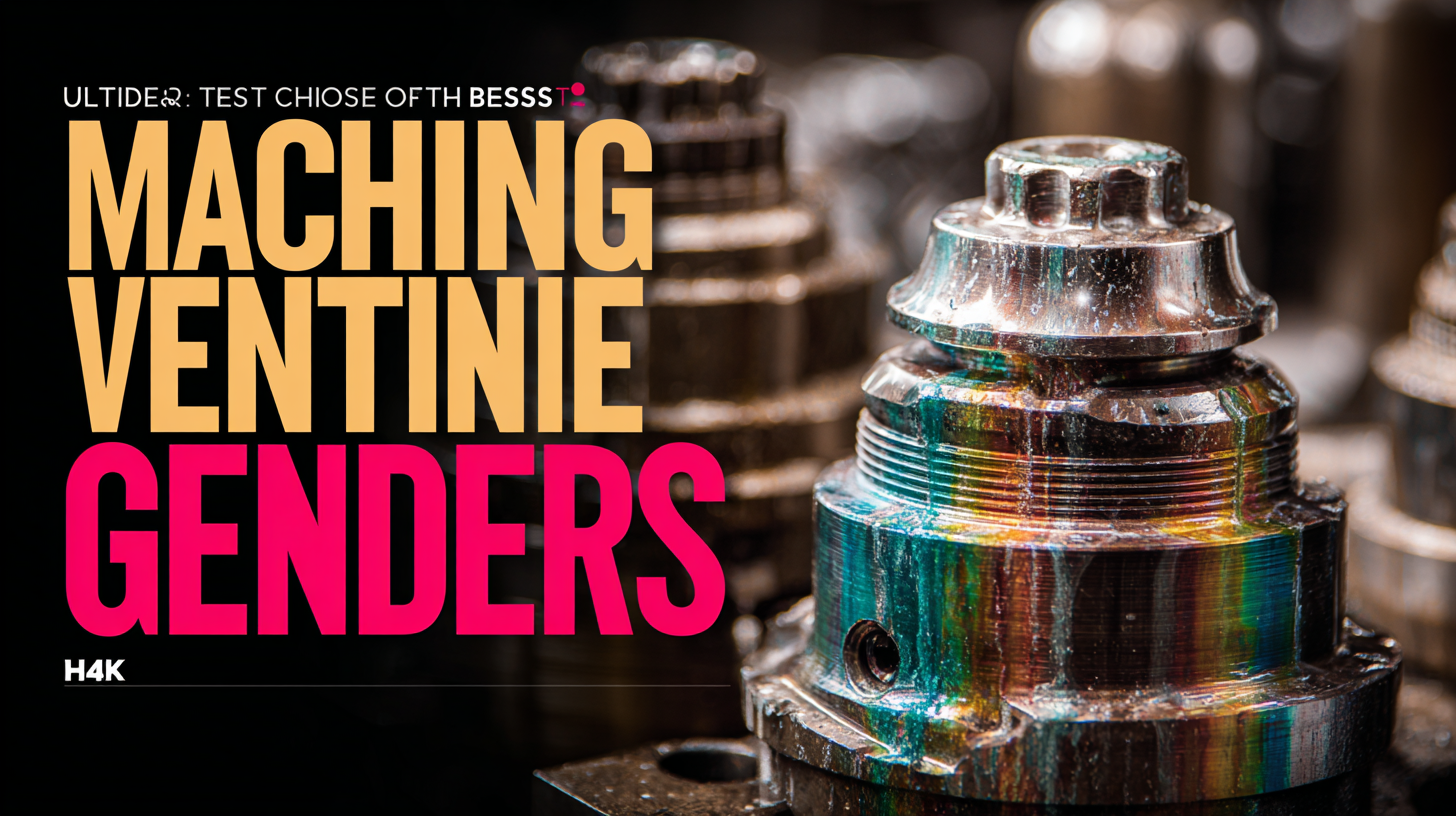In today’s competitive manufacturing landscape, selecting the right machining vendors is critical for achieving business success. According to a recent study by Grand View Research, the global precision machining market is expected to reach $201.51 billion by 2028, highlighting the importance of strategic vendor partnerships in optimizing production efficiency and reducing costs. As companies increasingly seek to enhance their supply chain reliability and innovate their product offerings, the role of skilled machining vendors becomes paramount.

This ultimate guide will navigate you through the essential factors to consider when choosing machining vendors, ensuring that your business not only stays ahead of the curve but also fosters long-term partnerships that drive growth and quality. By understanding market trends and the capabilities required from vendors, businesses can make informed decisions that align with their operational goals and overall strategy.
When selecting machining vendors, understanding your specific machining needs is crucial for achieving business success. One of the primary factors to consider is the type of materials you will be working with. Different vendors specialize in various materials, such as metals, plastics, or composites. Ensuring that a vendor has the appropriate expertise and machinery to handle your chosen materials can significantly impact both quality and lead times. Additionally, you should evaluate the vendor's capabilities regarding precision and tolerance levels to match your project requirements.
Another key factor is the vendor's technology and equipment. Advanced machining technology can enhance efficiency and produce higher quality components. Research the tools and processes that the vendor employs, such as CNC machining or additive manufacturing, to determine whether their capabilities align with your needs. Furthermore, consider the vendor's ability to scale operations, as your project may grow or change, necessitating a flexible and capable partner. By carefully assessing these factors, you can select a machining vendor that not only meets your current requirements but also supports your long-term business goals.

When selecting machining vendors, evaluating their technical expertise is crucial to ensure that your business can achieve its production goals. Look for vendors with a strong background in the specific machining techniques relevant to your projects, such as CNC machining or additive manufacturing. Their experience not only reflects their ability to meet quality standards but also indicates their familiarity with industry-specific requirements. A vendor's expertise can significantly affect the precision and efficiency of your production processes.
In addition to technical skills, the utilization of advanced technology plays a vital role in a vendor's capabilities. Assess whether potential vendors employ cutting-edge machinery and software, as this can enhance both the speed and accuracy of production. Vendors who invest in the latest technology are often more agile and can better adapt to changing demands. Furthermore, these technological advantages can lead to more cost-effective solutions and reduced lead times, ultimately benefitting your project's timeline and budget. Hence, a thorough inspection of both technical expertise and technology utilization is essential for forming successful vendor partnerships.
| Vendor Capability | Description | Rating (1-5) |
|---|---|---|
| Technical Expertise | Ability to handle complex machining processes and materials. | 4 |
| Technology Utilization | Use of advanced machinery and software for precision work. | 5 |
| Quality Assurance | Implemented processes for ensuring product quality and standards. | 4 |
| Customer Service | Responsiveness and support provided to clients during and after the project. | 5 |
| Delivery Time Maintenance | Ability to meet scheduled delivery times consistently. | 3 |
| Cost Competitiveness | Pricing models that offer value without compromising quality. | 4 |
| Innovation | Adaptability in using cutting-edge technologies and processes. | 5 |
When selecting machining vendors, understanding cost structures is crucial for achieving the right balance between quality and affordability. Different vendors employ varying pricing models, influenced by factors such as materials, labor, and overhead costs. It's essential to analyze these components meticulously; a lower price does not always equate to better value if it compromises the quality of the output. Businesses must conduct thorough research to identify vendors whose pricing aligns with their quality expectations.
Another critical aspect is the need for transparency in pricing. A good machining vendor should provide a detailed breakdown of their costs, allowing you to see where your money is going. This transparency helps in negotiating better deals and establishing long-term partnerships. When vendors are upfront about their pricing strategies, it fosters trust and ensures that both parties have a clear understanding of the project’s financial framework. Balancing quality with cost is not merely about finding the cheapest option; rather, it’s about making informed decisions that will contribute to your business's overall success.
When assessing vendor reliability, two crucial performance metrics come into play: lead times and delivery performance. In today's complex supply chains, disruptions can propagate through networks, affecting numerous stakeholders. To ensure sustained business success, companies must evaluate their vendors not just on cost and quality, but also on how well they manage their supply chain resilience in the face of such disruptions.
A vendor that excels in lead times demonstrates the ability to meet or exceed delivery commitments consistently, which is fundamental in maintaining operational continuity. Moreover, a vendor's approach to sustainability and adherence to social and environmental standards reflects their commitment to resilience and ethical practices. As organizations increasingly focus on responsible sourcing, a vendor's performance in these areas will be key in the decision-making process. Evaluating past delivery performance can reveal insights into their reliability, helping businesses select partners who align with their goals for efficiency and sustainability in the supply chain.

Establishing long-term partnerships with machining vendors is essential for business success, as effective communication and robust support strategies can significantly enhance operational efficiency. According to a report by the International Journal of Advanced Manufacturing Technology, companies that prioritize regular communication with their vendors experience a 23% improvement in project timelines and a 19% increase in overall quality. This underscores the importance of open channels for information exchange, allowing for timely updates, feedback, and adjustments that can streamline the manufacturing process.
Additionally, building a strong support structure is crucial for fostering these partnerships. A survey by the National Association of Manufacturers found that 63% of manufacturers who invest in vendor relationship management observe a substantial decrease in production errors and material waste. By implementing strategies such as regular performance reviews and collaborative problem-solving sessions, businesses can not only enhance their operational outcomes but also create a more resilient supply chain. This proactive approach not only mitigates risks but also cultivates trust and reliability between partners, paving the way for mutual growth and success in the competitive machining landscape.
